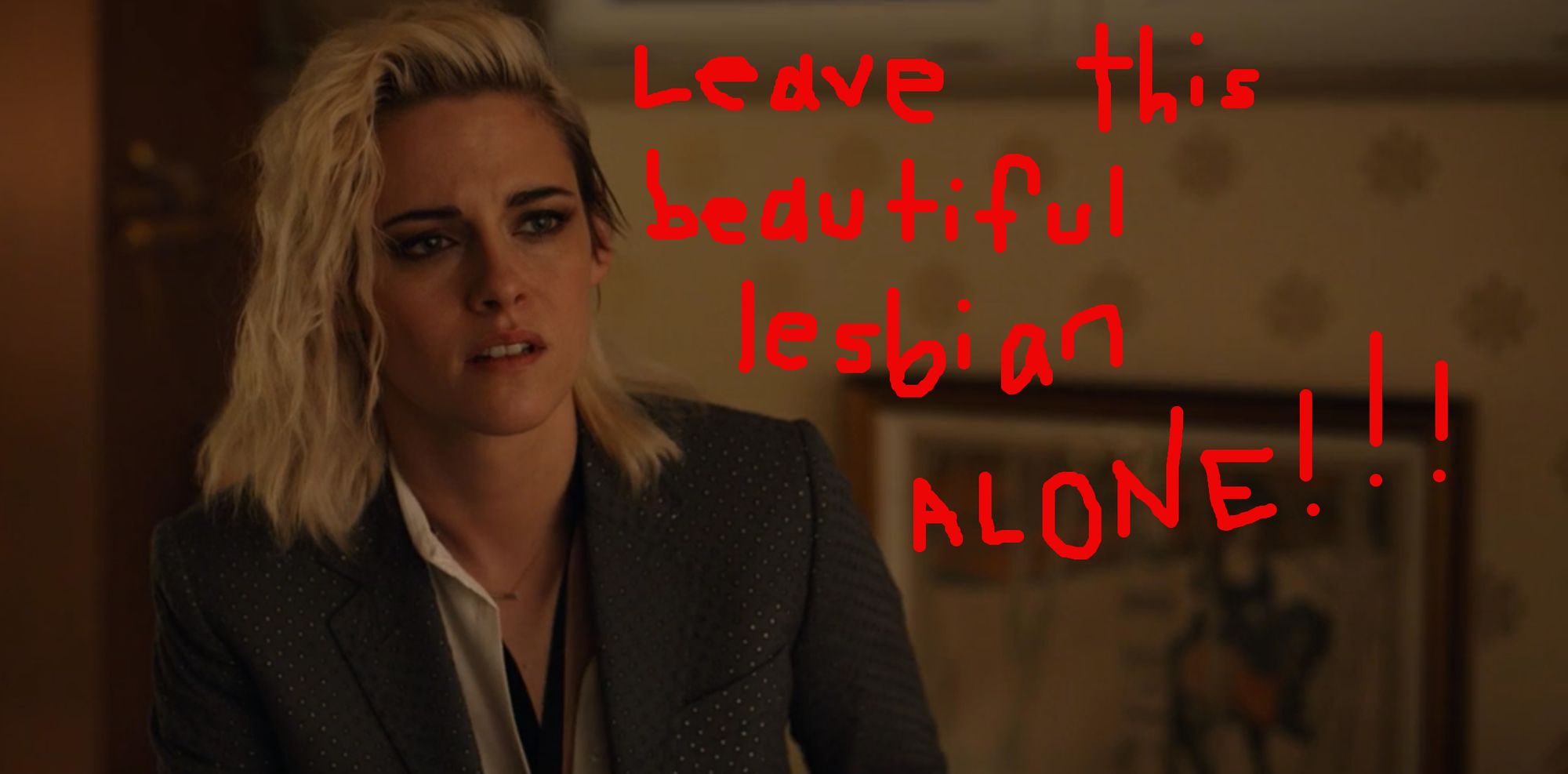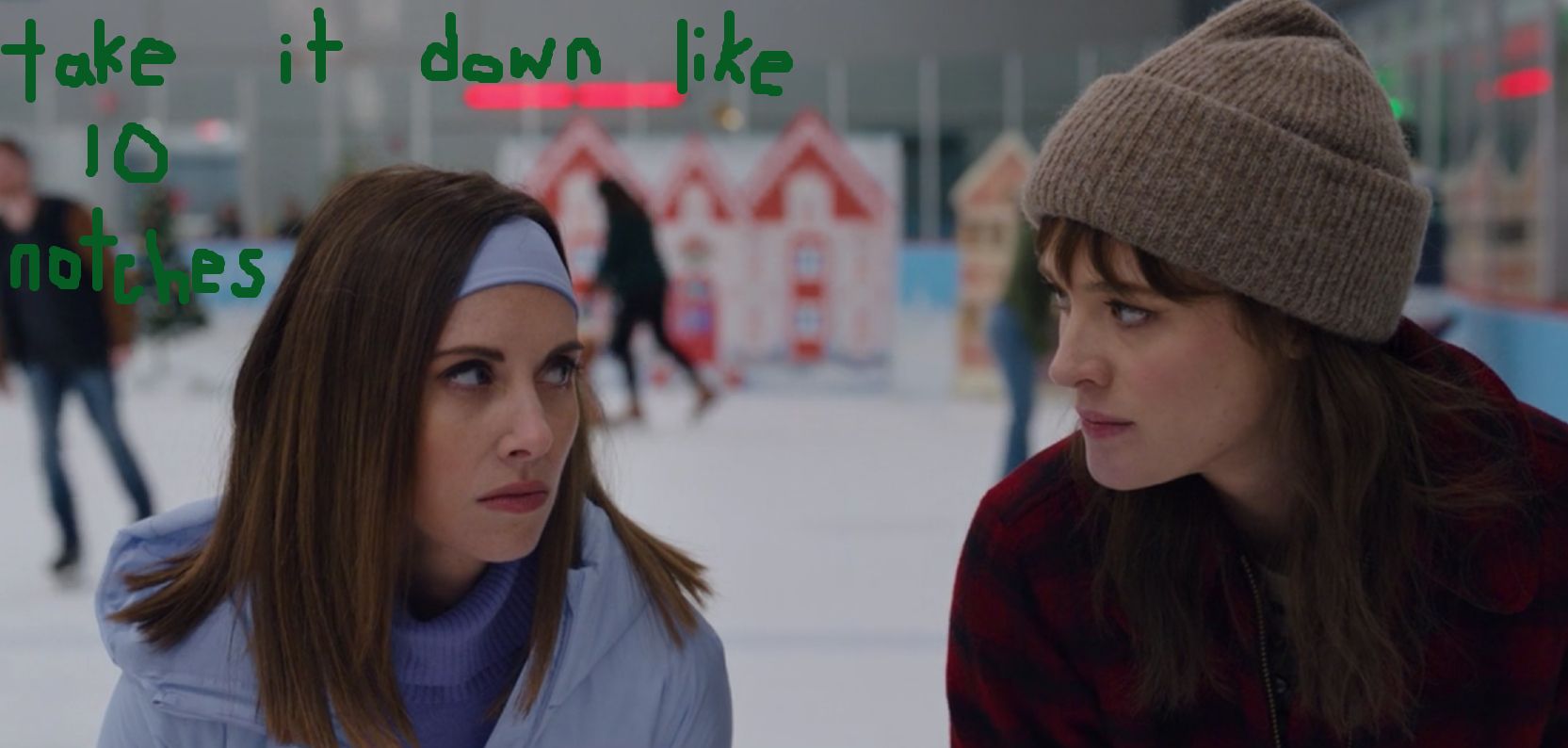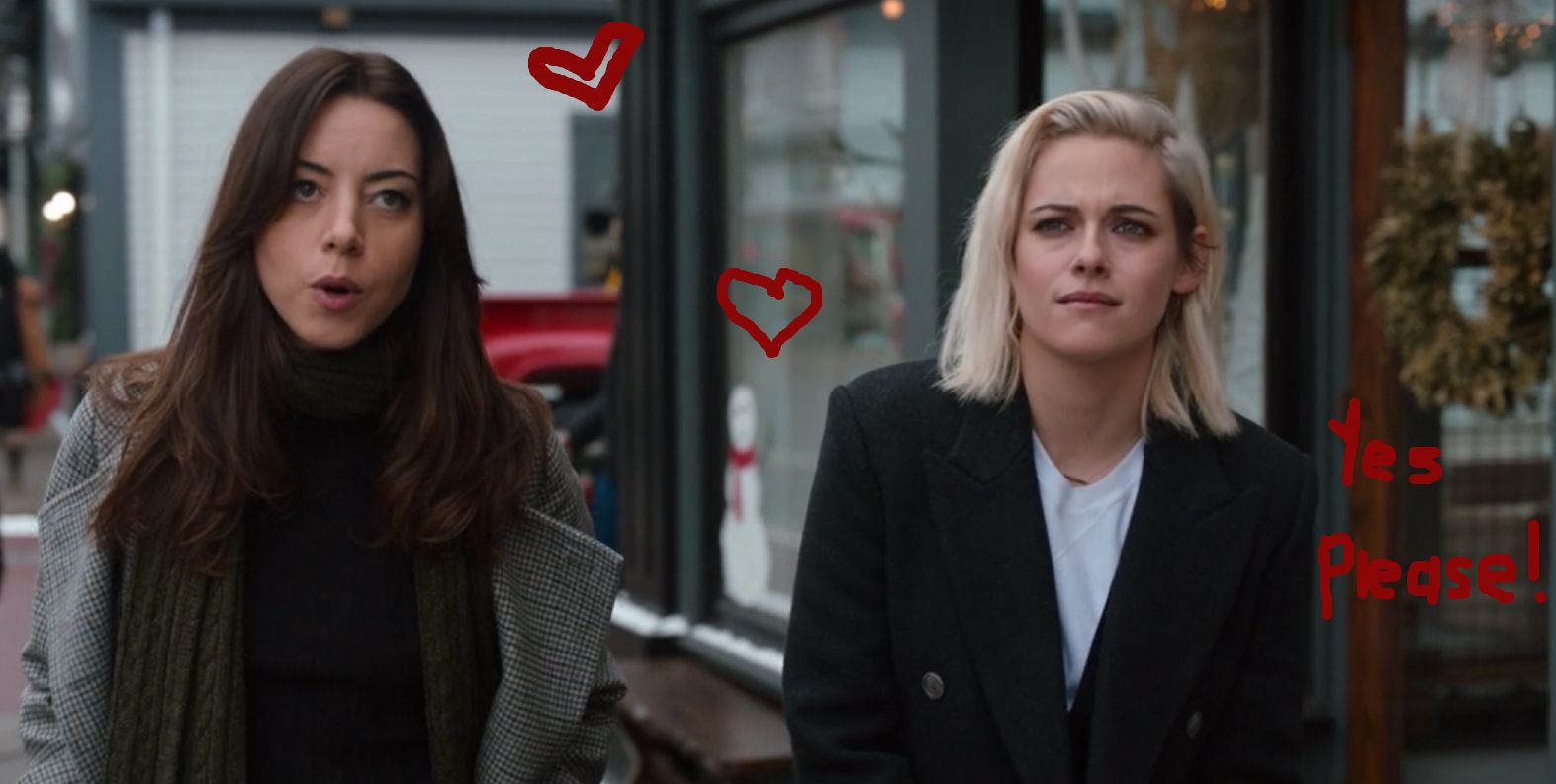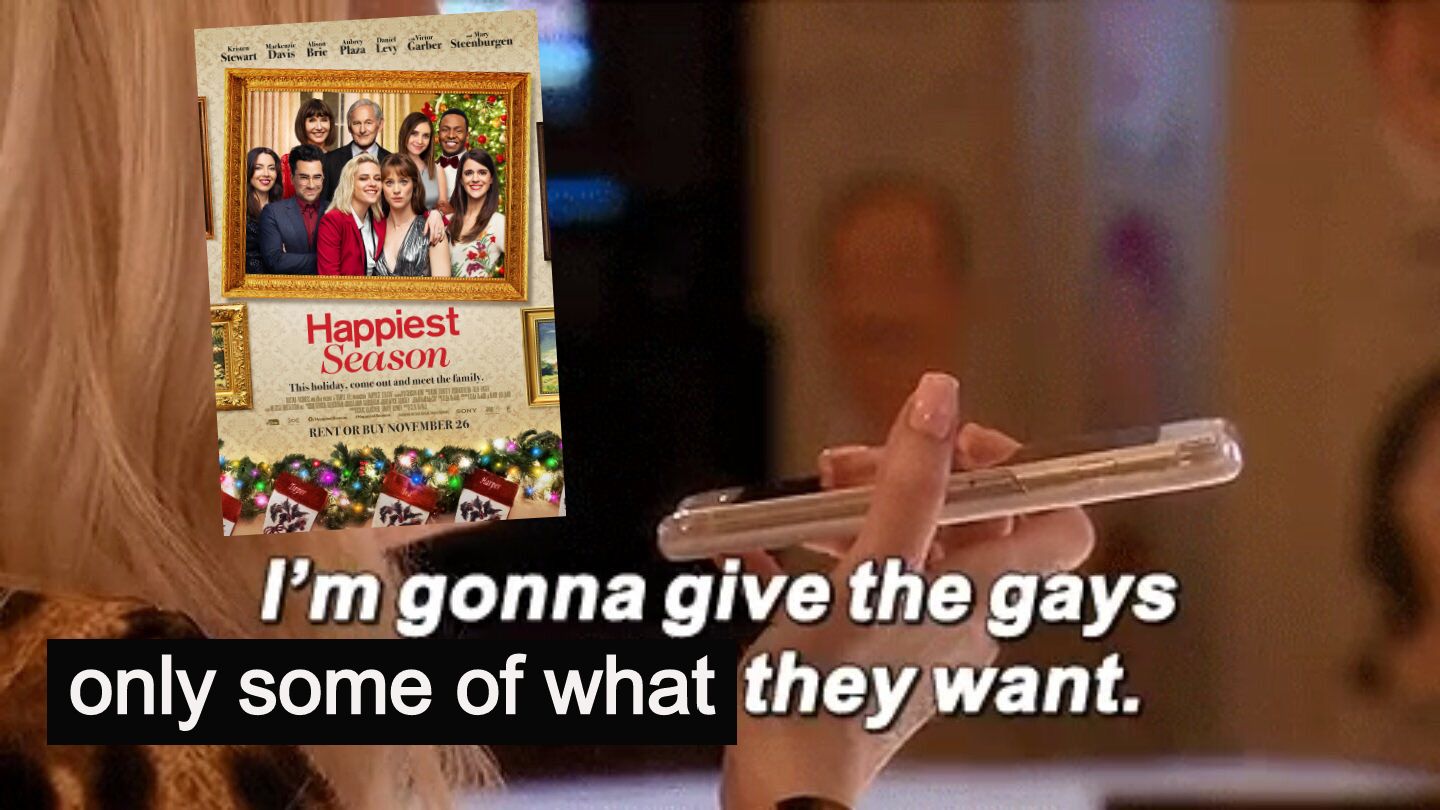"Happiest Season" made me sad!
K. Stew doesn't deserve this! I don't deserve this!

I’m not the biggest Christmas person. I love all holidays more or less equally, because I love celebrating things, so I don’t like it when everyone jumps the gun right after Halloween and doesn’t give Thanksgiving its time to shine. Plus, the cheery music and decor everywhere can have the vibe of mandatory fun, like an office potluck you have to bring a dish to and look like you’re enjoying.
But I was genuinely excited when I first heard about Happiest Season, a queer Christmas rom-com starring Kristen Stewart. Sure, it would be cheesy, and sure, there would be some goofy plot contrivances leading to wacky situations, but that’s a Christmas rom-com for you! I was prepared for some corniness and in exchange for Kristen Stewart playing a doting girlfriend, Dan Levy looking handsome in sweaters, and Alison Brie and Aubrey Plaza popping up presumably to be delightful, as is their wont.
I was not prepared to watch Kristen Stewart get her heart stomped on for two hours, every ounce of pain registering on her delicate, gorgeous face!! I was not prepared to root against Alison Brie! I was not prepared to be sad!!!

I’m gonna spoil this movie, so jump ship now if you want to watch it. Go stream it on Hulu and then come back and read this when you’re mad about what the movie put you through.
Kristen Stewart plays Abby, a woman who doesn’t like Christmas but loves her girlfriend, Harper (Mackenzie Davis). Harper insists that Abby come home to spend Christmas with her family, so Abby confides to her Gay Best Friend Dan Levy that she’s going to use the opportunity to propose to Harper. What the movie could have done here was make Harper’s family very quirky and obsessed with Christmas, so they’re suspicious of Abby for not being full of Christmas cheer. She’d win them over so she could propose to Harper, and in the process she would learn that Christmastime is truly the happiest season. That would be corny but cute!
Instead, Harper — who insisted that Abby come to Christmas with her family!! — reveals en route to their home that her family would not accept her if she came out because it would jeopardize her father’s political ambitions. She’d lied to Abby in the past, saying that she was out to her parents and they accepted it! Now she wants Abby to pretend to be her heterosexual roommate for five days!
Not only that, but Harper has somehow never mentioned to Abby, in their year of dating, that she comes from a family of maniacs!! Harper’s sister Jane (played by screenplay co-writer Mary Holland) is obnoxious and over-the-top, and her sister Sloane (Alison Brie) is openly antagonistic. Sloane and Harper are supposed to be fiercely competitive with each other, but both actresses play their dynamic with bloodthirsty rage that crosses several lines past sibling rivalry. All of this dysfunction stems from the way they were raised by their parents, Ted and Tipper (to give credit where it’s due, this movie excels at WASP-y names). The family has kept up appearances to bolster Ted’s career, but behind closed doors, Jane was ignored and ostracized, while Harper and Sloane fought to out-achieve each other to earn their parents’ affection. That is a very dark premise for a zany meeting-the-in-laws rom-com! The Caldwells are not uptight sticks in the mud or amusingly persnickety. Such facades could be believably penetrated to reveal a flawed but wholesome family underneath. With the exception of poor Jane, these people are assholes who hurt everyone around them.

Obviously we’re not supposed to think that. Of course the family is supposed to be redeemable. You can tell by the casting of Harper’s parents, played by Mary Steenburgen and Victor Garber. Because I’m a normal human being, I’m predisposed to love both of them. Mary Steenburgen is the quintessential cute mom. I’m expecting her to open her heart to the outsider just like she did with Buddy the Elf. And I will never hate Victor Garber, ever. I have listened to the Broadway cast recording of one of his shows about ten million times and Victor Garber is so charming and compelling in it that I have to fight the urge to root for his character, even though he uses the n-word and assassinates the 16th president of the United States, Abraham Lincoln.
So we’re supposed to see Ted and Tipper as good people who are just a little conservative. How conservative are we talking here? Their politics are never discussed. Apparently, having a lesbian daughter would sink Ted’s campaign for mayor, but I would think that in this day and age, a Republican politician would flaunt their gay kid as a shield against accusations of homophobia. Sloane is married to a Black man and has biracial children, but Ted and Tipper don’t seem to have a problem with that. But Sloane later reveals that she’s getting a divorce, and that is a shameful secret she has to keep from her family. The family is going through all this for Ted’s chances in local politics! In the present day! Dick Cheney’s daughter was openly gay during the 2000 presidential race when her father was on the GOP ticket, and that was 20 years ago!
(A more confusing character choice is the fact that Ted dotes on Harper and looks down on Sloane because of their jobs. Sloane had gone to law school and been an attorney, but she and her husband now run a company that makes custom gift baskets. It’s supposed to be frivolous, and the movie makes lots of jokes about the flowery language that they use to describe their “curated gift experiences,” but Sloane also seems to be killing it! Sloane says that Goop loves her products, and bougie white people like her family should eat that shit up! Harper is a journalist at a local paper, so realistically her job should be on the chopping block, while Sloane launched a successful brand. I don’t see why she’s considered the less impressive career woman here!)
A similar premise was handled much better in the 1996 Mike Nichols classic The Birdcage. Robin Williams plays Armand, the openly gay father of a college-aged son, Val, who is engaged to Barbara, the daughter of a staunchly conservative senator. Val begs his father to pretend to be straight and hide his partner, Nathan Lane’s flamboyant character Albert, from Barbara’s judgmental parents when they first meet. The setup of The Birdcage makes more sense for several reasons, like the obvious fact that it was set 25 years ago. It was more acceptable in the 90s to set aside politics in friendships, so Barb’s family is understood to be uptight but not villainous. That’s not the case anymore, but Happiest Season glosses over the implications of Ted’s politics. Did he vote for Donald Trump? Does he support conversion therapy? Has he had any ugly or tense discussions about Black Lives Matter with Sloane’s husband? Another key difference in The Birdcage is that Val and Barbara are kids, neither even old enough to drink. That makes it much more understandable that Val would do something as cruel as forcing his father back into the closet — he’s young and insecure, making a big decision he hasn’t really thought through. In Happiest Season, Harper is a grown woman inflicting that cruelty on her own partner without so much as a discussion beforehand.
Harper is the real problem with this movie. The audience is never given a reason to root for her other than sympathy for her internalized homophobia. Moreover, surprising Abby with the news that she’s not out to her parents isn’t Harper’s only sin. This movie gives Harper so many chances to redeem herself, and every time she chooses to throw her beautiful, supportive girlfriend under the bus. There’s a (now-cliché) movie making principle called “save the cat” that instructs screenwriters to include a scene in the beginning of the film to make the audience root for the protagonist. Technically, I suppose a scene of Harper insisting that she and Abby trespass on a stranger’s roof is supposed to be endearing, but this script mostly gives Harper “kill the cat” moments. She keeps doing things that seem designed for the audience to root against her.
She ditches Abby to hang with high school friends and her ex-boyfriend at a bar that’s literally called Fratty’s. She flirts with said ex at her parents’ Christmas party to keep up appearances. She’s constantly giving Abby mixed signals: inviting Abby home and then revealing that they must pretend to be roommates, sneaking into her room for a hookup and then panicking when they’re almost discovered, and subtly holding her hand at a fundraising dinner but ignoring her the rest of the night. Most damning of all is the backstory of Harper’s first girlfriend, Riley, played with depth and grace by Aubrey Plaza, whom Abby turns to in order to understand why Harper changes so much around her family. Riley reveals that she had been best friends with Harper since childhood, which evolved to a secret relationship in high school. When friends discovered a love letter from Riley to Harper, Harper outed Riley and claimed that Riley was a creepy lesbian who was obsessed with her. The story spread, and Riley was bullied for the rest of her time in high school.
This is what made Harper feel like an actual villain to me, though a friend said that her final straw was when Harper destroys a painting that poor Jane had labored over right before denying that she was with Abby. Different music and fewer jokes could have made this an indie family drama, but this is ostensibly a comedy that revealed an hour in that the love interest inflicted unspeakable cruelty on someone who loved her, is now harming the woman who wanted to marry her, and rejects her partner even when her secret is clearly out. Before I saw the movie, I’d seen tweets from people saying that Aubrey Plaza and Kristen Stewart should have ended up together, but I’d assumed that it was just normal shipping discourse. I hadn’t realized that Riley would be the only character in the movie who would treat Abby with kindness, nor that her own girlfriend would treat her like trash!

Okay, updated pitch: Abby and Harper are in a very new relationship. On one of their dates, Abby shares that she has no family to visit for the holidays, and Harper, tipsy and still eager to impress this cool lesbian, invites her to come home with her to spend Christmas with her family. However, she confesses the next day that she’s not out to her family. Abby tries to give her the benefit of the doubt, but her family sucks ass and she ditches them all for Riley. Riley rules and she brings Abby home to meet her family, who embraces her. Abby learns to love Christmas and she and Riley kiss a lot and make cookies together.
Or here’s another alternative: Abby is, as the film establishes, comfortable in her identity and from a family who always accepted her. Harper is working up the courage to come out to her family. Her dad isn’t in politics, but she’s from a very small town that’s gossipy and she knew this girl Riley whose family kicked her out when they found out she was gay, so she’s always been afraid that her parents would do the same. They’re not as rich as the other people in town, and her parents are desperately concerned with keeping up appearances. Abby says that she’ll help Harper come out, so they make the decision together to go home for Christmas. Maybe when they get there, there’s some kind of wacky mixup where the family just assumes she’s a roommate, and Abby goes along with it initially because she can tell Harper feels put on the spot. They keep up the ruse for as long as it’s comedic, but Harper finally gets up the courage to tell her family the truth. They’re frosty for a bit, and Abby supports Harper and Harper defends her relationship with Abby. Abby, in an effort to meet the traditional parents halfway, asks Harper’s dad for his blessing to marry Harper, even though she’d normally consider the concept antiquated and problematic. Eventually the family comes around, and we get to see them all enjoying the happiest season for more than two minutes in montage right at the end. They even invite Riley and Dan Levy, who’s still in the mix somehow, to spend the holidays with them, because chosen family can be just as valid as real family.
I’m mad because this movie doesn’t completely suck, but it could have been so good. The cast is incredible! Kristen Stewart’s hair, makeup, and wardrobe are constantly aspirational. She grounds the movie with an incredible performance, and I wish the script treated her character better. Dan Levy’s character has a scene about the difficulties of coming out that really resonated with me, but it needed to come far sooner in the movie to get me on Harper’s side. The predictable resolution — Harper’s family realizes they all need to be nicer to each other! — arrives too late and wraps up too quickly to make sense in the narrative. Sloane’s breakdown in the genre’s required tension-erupting scene feels legitimately bleak and upsetting. I was reminded of the climax of Diablo Cody’s dark dramedy Young Adult, which was horrifying on purpose and could not have been the inspiration for a scene in an actual romantic comedy. Why couldn’t I just get this cast in that wardrobe and those locations… having fun?!

I had to confirm that the script was directed by an actual lesbian, because the script felt so off to me. There were small details that felt wrong, like two queer women in their 30s choosing to keep dairy milk in the house or the Caldwell family never noticing that Abby and Harper wore matching lesbian necklaces, and huge ones, like the script’s overall allegiance to Harper after she continually chose her family’s comfort over her partner’s well-being. At one point, Harper explains with distress that if she chooses Abby, she would lose her family. At no point were we ever shown a single reason for her to choose her family! That binary option — hellish family or loving partner — felt like telling your partner “I just can’t decide if I should live with you or in a cave of ravenous wolves,” and it seems especially unkind to bring up if your partner has no family at all because her parents died!!
I wonder if director/co-writer Clea DuVall thought that an LGBTQ story had to involve some trauma and conflict to feel “real.” I thought of co-star Dan Levy’s own show, Schitt’s Creek, when watching Happiest Season, because he has said that he made the conscious choice never to subject his character, David Rose, to any of the judgement and cruelty you might expect from the residents of a small rural town. “I have no patience for homophobia,” he said. “As a result, it’s been amazing to take that into the show. We show love and tolerance. If you put something like that out of the equation, you’re saying that doesn’t exist and shouldn’t exist.” This decision creates a safe space for queer audiences who could be triggered by such scenes, and it also models acceptance for straight audiences without centering their discomfort as the default response to queer characters.
DuVall said in an interview that “in a lot of ways, this movie is autobiographical just in that I’ve been both characters at different times in this movie.” I have a lot of questions about that statement. Did she have an experience dating someone whose parents were conservative but ultimately cool, and if so, was it the 90s? Did she out someone in high school and feels lingering guilt about that? Does she have a terrible family that she wants to excuse despite their toxicity, but she should really go to therapy and learn to cut them out of her life entirely? (“Toxic” really is the key word for almost every relationship in this film, so much so that when I looked up the Twitter conversation for this movie, the search box autofilled “happiest season toxic” when I started to type the title.) She could have just made a traumatizing coming-out story where one sister is completely ignored, one is closeted and neurotic, and one is so full of seething rage that she can’t make polite small talk at a Christmas party without snapping “I’m bored of this conversation, I’m leaving now,” but none of those elements belong in a Christmas rom-com about popping the question!
The real problem, I guess, is that this is the only lesbian holiday rom-com we have. If the genre were more diverse, I wouldn’t be so disappointed by a film that didn’t work for me. The good news is that Happiest Season has been incredibly successful, so perhaps Hollywood will start churning out gay holiday romps to cash in on this trend. Hire me to write for them, Tinseltown! I want more than the inevitable sequels to this one. Wedding Season will of course follow Abby and Harper as they plan their wedding, Harper treating Abby like garbage because her mom wants to plan a big shindig and Sloane insists on providing garish gift baskets, and Open Season will end the trilogy when the family finally snaps and kills each other. Enjoy that! I’ll be rewatching Carol and cleaning up my pitch for a holiday rom-com starring Samira Wiley and Abbi Jacobson falling in love. No one has to come out in it. There’s no trauma, just the regular foibles that heteros get in their comedies. Elliot Page plays Abbi’s tiny best friend, and Phoebe Bridgers will contribute an original song for the melancholy part of the movie but Carly Rae Jepsen will score the big fun montage at the end. It’s what we deserve! A truly happy season for all!
More like this:
“I didn’t feel empowered by Sucker Punch”
“I would have changed some things about The Knight Before Christmas”
